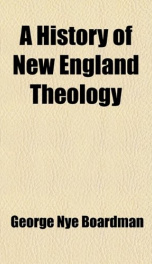a history of new england theology

Purchase of this book includes free trial access to www.million-books.com where you can read more than a million books for free. This is an OCR edition with typos. Excerpt from book: Pelagians and Arminians. The Pelagians are rationalists and naturally drift into Unitarianism. The term Arminian now suggests the Methodists, but the Arminians of Edwards' day were the Liberals, whose natural successors are to be found to some extent among the Unitarians, still more among the Methodists, and in goodly numbers among Orthodox Congregationalists. The Calvinists also fall into two , parties: the "Old Divinity" men and the "New Divinity" men. The Old Divinity men are sometimes called " Old Calvinists;" a better designation is "Moderate Calvinists." Some of their views resembled those of early Arminians. The New Divinity men were known as Hopkinsians. They often called themselves "Consistent Calvinists." Their theology is the " New England Theology." Their most strenuous contentions, which will be noticed hereafter, were in opposition to Moderate or Old Calvinism. THE RELIGIOUS CONDITION OP NEW ENGLAND IN 1730. The rise of New England Theology was contemporaneous with the great revival. The country was prepared for theological investigation as well as susceptible of religious excitement. Christian people had become alarmed over the lax state of public morals, and the public mind was deliberating upon the comparative worth of a liberal and a strict scheme of doctrine. These two points are worthy of notice, as preparatory to a study of the topic before us. 16 NEW ENGLAND THEOLOGY. 1. The Lax State Of Morais. It seems a defiance of natural development, and a mockery of human purposes, that the model Christ- tian Commonwealth of the Puritans should fall into gross immoralities. That a century of experience under the domination of the strictest rules of righteousness should result in social vices and disorders, almost leads us to despair of the final prevalen...
Info about the book
Author:
Series:
Unknown
ISBN:
1146548311
Rating:
3/5 (3)Your rating:
0/5
Languge:
English
Users who have this book
Users who want this book
What readers are saying
What do you think? Write your own comment on this book!
write a commentGenre
if you like a history of new england theology try:
Other books by this author
Do you want to exchange books? It’s EASY!
Get registered and find other users who want to give their favourite books to good hands!


